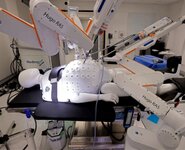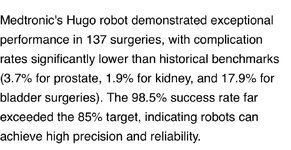You probably don’t believe cars can drive themselves, rockets can be caught out of the air, or that we are even having a conversation on a device in our hands. To say this will never happen is very naive.
Will it take time, yes, but AI is self learning, never sleeps, never gets sick, doesn’t take vacations. Will there still be doctors to consult with, yes, but instead of there being 100 docs at a hospital you’ll only have maybe 50.
Your example shows that for some medical examinations having a human administering is the best, and I think those types of things would be limited to just that.
I personally would rather speak with a real person when it comes to medical, I don’t even like doing telemedicine.
Just a quick google search will show you where the tech is going.
View attachment 873701
View attachment 873702
Wealthy business magnate Elon Musk asserted in a post on X that robots will outshine even the best human surgeons within around five years.

www.foxbusiness.com
Sent from my iPhone using Tapatalk


